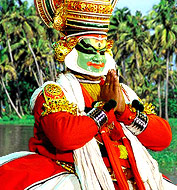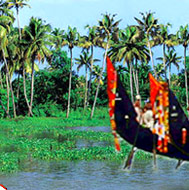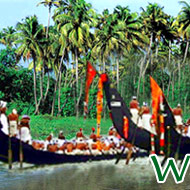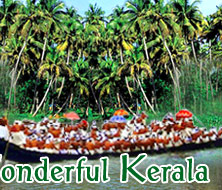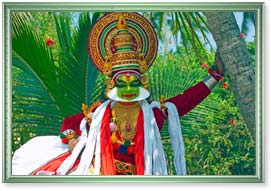 Kerala, referred to as "God's Own Country", boasts of a tradition and cultural heritage that trails several years back. Dancing, which forms an integral part of any country or region's culture, has, for long, been a part of many ceremonies, rituals, and celebrations, with the beautiful state of Kerala being no exception. Rather, a rich repository of more than fifty folk dances makes up for an equally rich cultural history. Keeping the same in mind, it is no surprise that many of these dances are amongst the most finely performed dances in the world. What make these dances special are the expressions that dancers portray while performing, expressions that reveal a refined artistic class. Also, the costumes and ornaments that are adorned by the performers take these dances to an all-new level. These folk music and dances have kept alive the ancient lore and stories of Kerala.
Kerala, referred to as "God's Own Country", boasts of a tradition and cultural heritage that trails several years back. Dancing, which forms an integral part of any country or region's culture, has, for long, been a part of many ceremonies, rituals, and celebrations, with the beautiful state of Kerala being no exception. Rather, a rich repository of more than fifty folk dances makes up for an equally rich cultural history. Keeping the same in mind, it is no surprise that many of these dances are amongst the most finely performed dances in the world. What make these dances special are the expressions that dancers portray while performing, expressions that reveal a refined artistic class. Also, the costumes and ornaments that are adorned by the performers take these dances to an all-new level. These folk music and dances have kept alive the ancient lore and stories of Kerala.Kathakali
Kathakali is a theatrical dance form of Kerala. Kathakali is known for its elaborate performances and was previously staged in only temples, mansions, and palaces of the rulers. Being one of the classical dances of India, it was previously an all male dance form, with males playing even female characters, but now females are also allowed to learn the art form. Furthermore, there are increasingly numerous exponents of this dance form. Kathakali events are held throughout the year in Kerala.
Mohiniattam
Mohiniattam is famous as the dance of the celestial enchantress. It is another classical dance form of Kerala, performed by only women and is known for its graceful movements and simple but elegant costumes. In the Mohiniattam performance, Vishnu is portrayed as a celestial enchantress, trying to mesmerize the demons to help the Gods get a full share of ambrosia, which gave them immortality. This is the legend/myth behind Mohiniattam and forms the core of this dance form. Historically, the temple dancers/devdasis performed the Mohiniattam in the temples of Kerala.
Kalaripayattu
Kalaripayattu is a martial dance form and perhaps the oldest martial art practiced in the world. Kalaripayattu derives its name from "Kalari" or the arena in which the combatants fight and "payattu" which means practice in Malayalam. Nowadays, Kalaripayattu is practiced more as fitness training and as a demonstration sport. In earlier times, soldiers and warriors practiced Kalaripayattu as a fighting art. It is interesting to note that previously, conflicts between courtiers and disputes between landlords were settled by bouts of Kalaripayattu. There are two main forms of Kalaripayattu - the Vadakkan form or the Northern style, and the Thekkan form or the southern style. Both these Kalaripayattu forms differ in their speed and movements.
Kaliyattam
Kaliyattam originates from an ancient socio-religious ceremony and a sacred dance performance for the Goddess, Kali, by which every village in Kerala was bound and had its own common shrine, in front of which the dance was performed on a regular basis. The word Kali signifies 'safety' in Malayalam.
Apart from these, there are many other folk and classical dances that boast the culture of Kerala, like Mudiyettu, Thiruvathirakali, Kolkali, Mamangam, Patakam, Poothamkali, Kuravar Kali, and several others.




